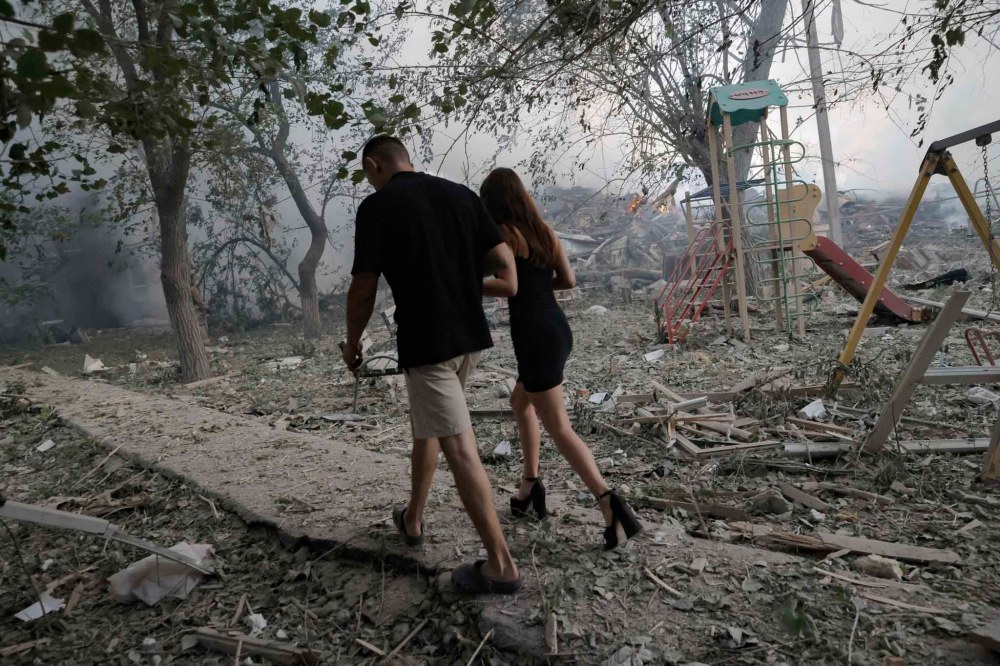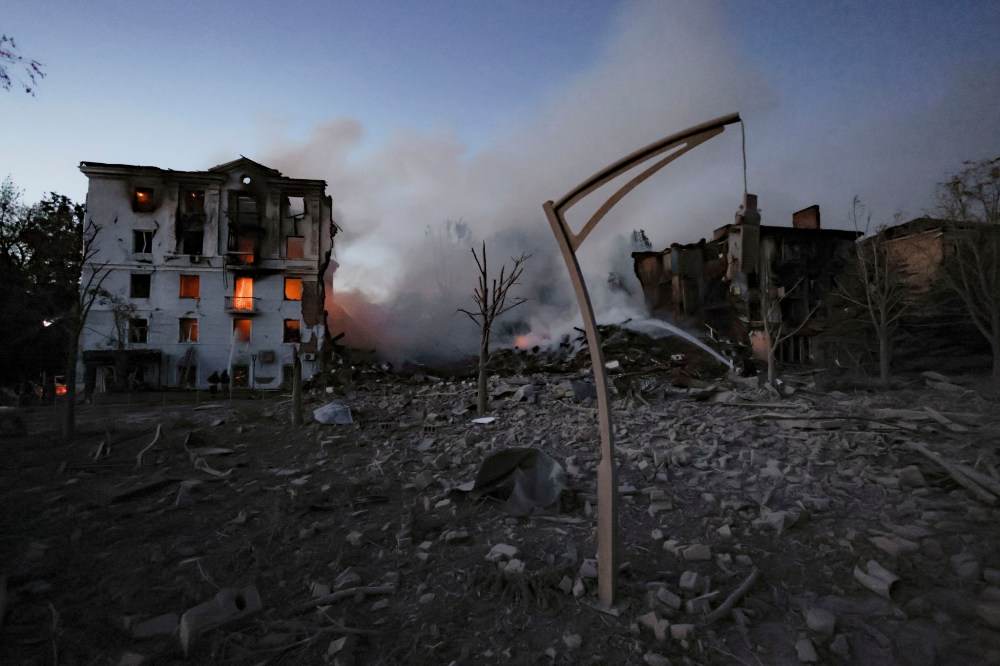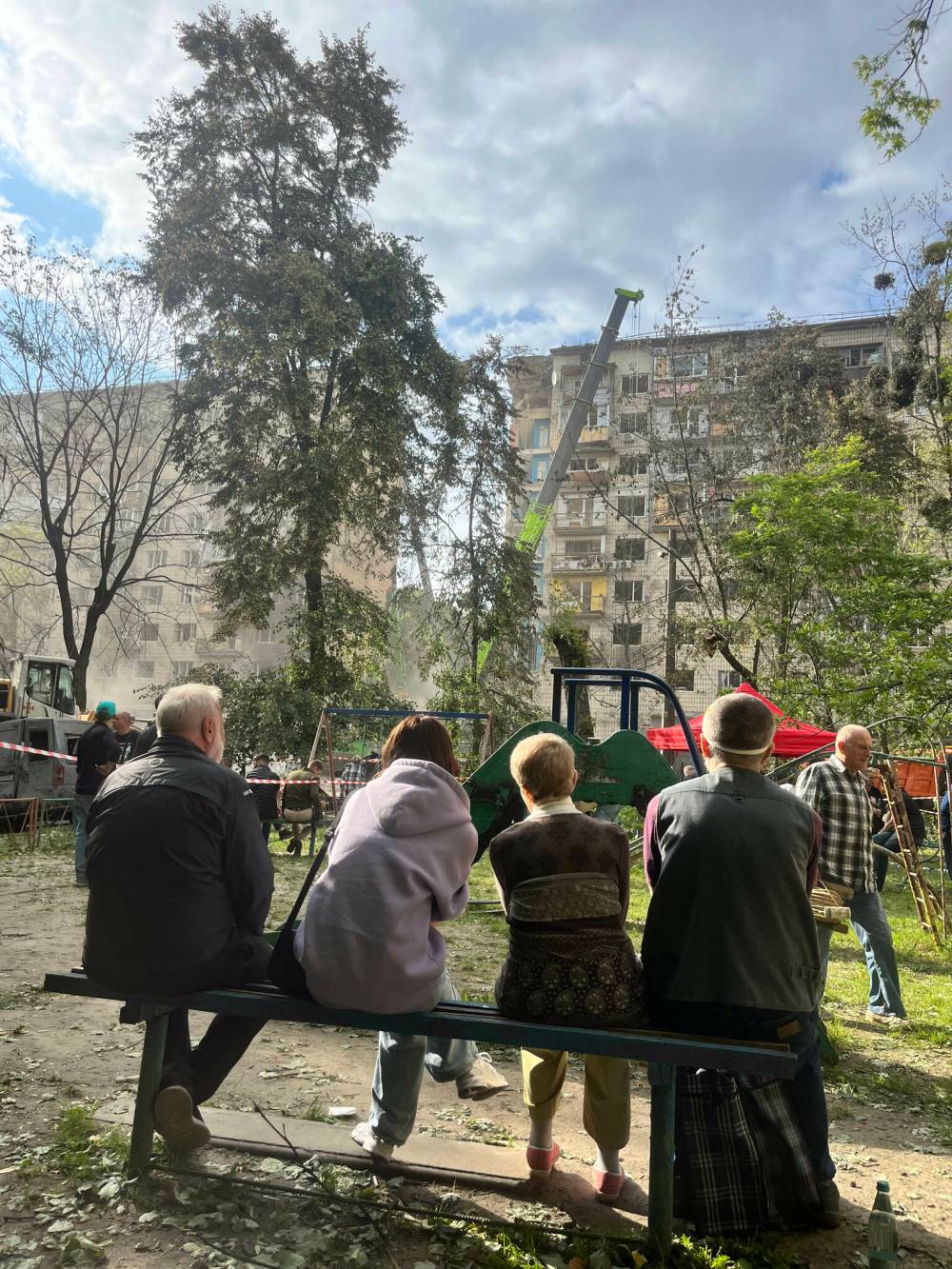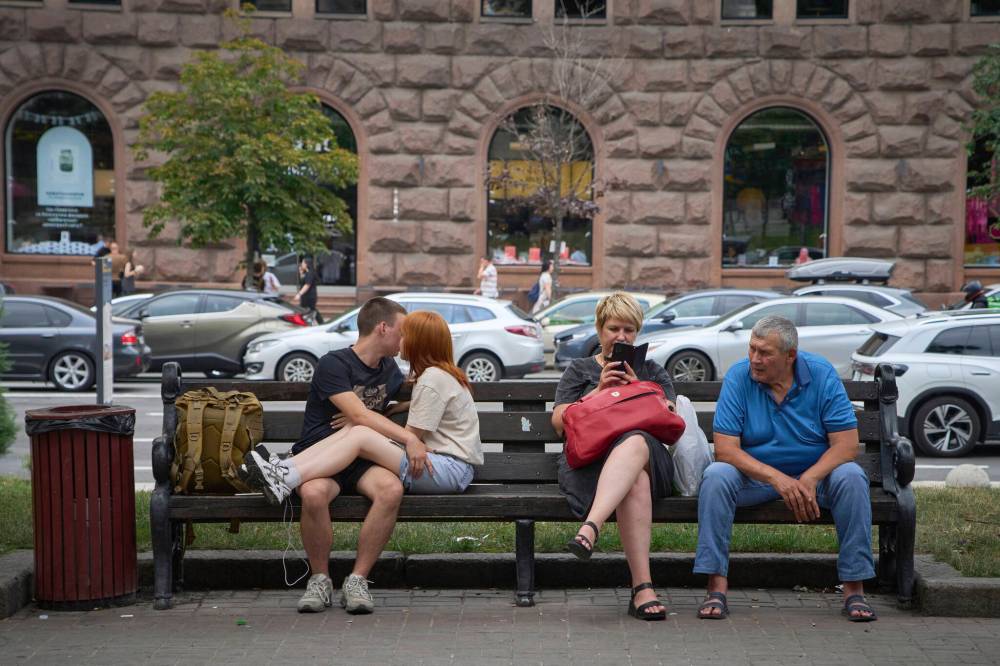Future hopes hostage to grinding war Ukraine mired in a precarious present with old lives shattered and cynicism surging
Read this article for free:
or
Already have an account? Log in here »
To continue reading, please subscribe:
Monthly Digital Subscription
$1 per week for 24 weeks*
- Enjoy unlimited reading on winnipegfreepress.com
- Read the E-Edition, our digital replica newspaper
- Access News Break, our award-winning app
- Play interactive puzzles
*Billed as $4.00 plus GST every four weeks. After 24 weeks, price increases to the regular rate of $19.95 plus GST every four weeks. Offer available to new and qualified returning subscribers only. Cancel any time.
Monthly Digital Subscription
$4.99/week*
- Enjoy unlimited reading on winnipegfreepress.com
- Read the E-Edition, our digital replica newspaper
- Access News Break, our award-winning app
- Play interactive puzzles
*Billed as $19.95 plus GST every four weeks. Cancel any time.
To continue reading, please subscribe:
Add Free Press access to your Brandon Sun subscription for only an additional
$1 for the first 4 weeks*
*Your next subscription payment will increase by $1.00 and you will be charged $16.99 plus GST for four weeks. After four weeks, your payment will increase to $23.99 plus GST every four weeks.
Read unlimited articles for free today:
or
Already have an account? Log in here »
In the waning days of Ukraine’s tense summer, a soldier named Yaroslav stepped off a train in Odesa, the historic jewel of Ukraine’s southern coast on the shores of the Black Sea.
He’d been granted a weeklong vacation from the front, and at a beach house nearby, a large group of his friends were already waiting.
They’d known one another a long time. A few hailed from Yaroslav’s hometown of Kramatorsk, a blue-collar city in Ukraine’s eastern Donbas region. Most had been friends since they were children, having met frolicking at summer camp in Koktebel, a resort town in Crimea. They’d kept meeting there every year to party, well into their 20s.
Residents walk past a home flattened by a Russian air strike in Kramatorsk, Ukraine on July 31. 
That life is gone now. In 2014, Russia illegally annexed Crimea. Kramatorsk is now just 20 kilometres from the front line, directly in the path of encroaching Russian forces.
But at least they still had the Black Sea.
It had been over a decade since Yaroslav had come to live in Odesa. He’d moved there in the summer of 2014, not long after Russian-backed militants seized the city of Donetsk, where he’d been living.
He worked in a restaurant there, and watched it fill up with Russian mercenaries and agents: a native russophone himself, he could tell by their strong accents.
At the time, like many in Eastern Ukraine, Yaroslav didn’t think the situation was that serious: a weird dust-up, he thought, that would resolve in a couple of months.
But the security situation in Donetsk quickly deteriorated. Checkpoints choked the streets; Russian soldiers seized civilian vehicles; blasts shook the city as Ukrainian forces fought to regain control.
”Everyone was thinking about the future, what to do next, where to go,” Yaroslav said, chatting at the beach house late one afternoon, speaking in Russian as a friend translated.
“People were afraid to leave the city, because of their safety.”
In the end, he and his girlfriend fled to Odesa, and stayed.
Life was peaceful there for a time: he went back to work in restaurants and attended sailing school, thinking of taking up a maritime career.
But in 2022, the war found him again.
He was in Kramatorsk the morning Russia invaded; despite having been witness to the start of the war in 2014, it came as a shock.
“Frankly speaking, neither myself nor my brother believed that a full-scale invasion would happen. On Feb. 24, we all realized how wrong we were.”
“Frankly speaking, neither myself nor my brother believed that a full-scale invasion would happen,” he said. “On Feb. 24, we all realized how wrong we were.”
In April 2023, he was drafted. Though he was surprised the military wanted him, given his back problems, he went willingly and was assigned to an anti-drone unit of Ukraine’s 35th Marine Brigade.
Since then, he and his small team have helped hold back the tide of Russian troops pressing into one of the front line’s most brutally violent sectors.
“The war is a bad thing,” he said. “But humankind has stayed in war more than stayed in peace. Now it’s our turn to fight. The major danger is that the war in Europe can lead to the Third World War, and maybe it’s already happened.
“It’s very unfortunate that humankind didn’t learn from the lessons of the Second World War.”
So the vacation in Odesa was a welcome reprieve, but it came at a strange time. That week, international headlines were seized by talks of peace. U.S. President Donald Trump was set to meet Russian President Vladimir Putin in Alaska; across international news, pundits — especially those aligned with Trump — hinted at an imminent ceasefire.
For the most part, Ukrainian soldiers do not put much stock in such talk. Many become, by psychological necessity, tied to the present: the war exists today. It will exist tomorrow.
Beyond that, why waste time contemplating a future they have no direct voice in deciding, and may not live to see?
There was something I was curious to ask Yaroslav, though. Russia’s demands, as reported, include Ukraine withdrawing from the last parts of the Donetsk and Luhansk regions it still controls, along with other concessions.
Smoke rises over a residential house destroyed by a Russian air strike on Kramatorsk, Ukraine, on July 31.
If Ukraine agreed to a ceasefire on those lines, it would mean Yaroslav and his comrades would have at least a sustained break from the horrors of the front line.
But it would also require Ukraine to simply give away his hometown, Kramatorsk, where Russian soldiers have not set foot since 2022, despite wasting tens of thousands of lives trying.
To Yaroslav, it was not such a difficult question. No, he said, a ceasefire on those lines could not happen.
For one, Ukraine cannot legally give up its constitutionally defined land. For another, it certainly can’t do it without an iron-clad security guarantee from its allies, one that would stop future encroachments.
“Even if we give up those territories, the war will be resumed in the next five years, with the focus on Dnipropetrovsk and Kharkiv,” he said,“So then we gave it up for what? Then you will have to give up something else again.
“So what’s the point in giving them anything, if they’re just going to keep taking things?”
My plane touched down in Winnipeg on Aug. 31, a warm Sunday morning, just before 10 a.m. A friend met me at the airport and helped me throw two groaning suitcases inside his car.
It had been more than 2½ years since I’d bid my goodbyes to him there, bound for Ukraine; I’d been living out of those suitcases ever since.
As we drove away from the airport, I drank in the sight of my city. It felt awkward and a little unreal, as if seeing an old flame after a long break.
Winnipeg looked the same, yet different. Its streets seemed eerily empty, devoid of the bustling pedestrian life that animated most Ukrainian cities, even those relatively close to the front lines.
Was it always like that? Had I just not noticed before? I wasn’t sure which had changed: the city, or me.
I wasn’t sure which had changed: the city, or me.
Already, I missed that life, all those people out in the street. When people asked why I took a leave from the Free Press and moved to Ukraine in January 2023, my answer, over time, grew increasingly brief: love. I fell in love. In love with a place, a people and with a person — though the latter is another story, for another time.
Love had not been the intention. Like most foreign journalists who flooded into the country in early 2022, war is what first drew me to Ukraine.
But the country I met was entirely unexpected. It was a wondrous place, defined not by the crimes of the aggressor but by a heart that was unvarnished and wild, stubbornly hopeful and defiantly free.
That Ukraine was a place of perpetual surprises. It was cities where every corner offered a new curiosity to be discovered, whispering a people’s stories of struggle and resurgence.
It was how the buildings of entire eras unceremoniously rubbed shoulders with each other, ancient to imperial to Soviet to modern.
It was crumbling monuments and bustling village markets. It was stone-faced old men playing chess in the parks and half-naked children jumping in rivers.
It was eating the sweet, herbal white flowers that dripped from the branches of low-slung trees; homemade wine in plastic bottles; grannies crouched on sidewalks, selling flowers and tomatoes and onions.
The more I sank into that Ukraine, the more rooted I became. What was supposed to be a one-year absence from the Free Press became two, and then closer to three; in truth, even as I boarded the train late last month to begin the long journey back to Canada, I didn’t want to leave.
MELISSA MARTIN / FREE PRESS Residents sit on a playground bench, watching rescuers search for bodies in the rubble of an apartment block destroyed by a Russian missile on the morning of July 17. Twenty-eight people were killed in the attack.
Yet I desperately needed a break. In the more than three years since I’d first arrived in Ukraine, the war had changed.
In Kyiv and other cities far from the front lines, this was felt most directly in sharply intensified strikes which were, in their length and ferocity, clearly designed to maximize psychological disruption to civilian life.
The numbers alone tell that tale. According to Ukrainian Air Force data, through most of 2023 and 2024, Russia launched fewer than 800 monthly missiles and large drones into the country.
Late last year, those numbers began to rise, and after Trump took office this January, they skyrocketed: this July, more than 6,000 such weapons shrieked into Ukraine.
Attacks grew long and relentless. Through May, June and July, the capital braced against onslaughts of drones, up to 400 or more in a night, along with bursts of ballistic and cruise missiles.
These assaults typically began shortly before midnight and lasted until after dawn, filling up to nine frightening hours with air-defence gunfire and massive explosions.
The death toll grew. Russian missiles razed multiple apartment blocks in the capital. More Kyiv residents began passing the nights in subway stations, sometimes having to run for cover as drones shrieked over their heads.
When the morning finally came, we would emerge blinking into the hazy light, smelling the acrid smoke of the fires that seized the city.
On the surface, Kyiv lived: there were concerts, cultural festivals, Pride rallies, protests. Friends gathered for beach parties on the Dnipro River, and bar patios filled up with patrons.
Yet it all felt strained. In private conversations, many residents confessed they could no longer sleep; could barely even get through a day without dreading the night.
EFREM LUKATSKY / THE ASSOCIATED PRESS People rest on a bench in central Kyiv, Ukraine in July.
In June, my friend Mark MacKinnon, the Globe and Mail’s senior international correspondent, returned to Kyiv for the first time since the previous autumn.
After just two days, he sent me a text: “Seems like everyone I’ve seen the last few nights is just hanging on,” he wrote. “I can sense the tension.”
I was interested, though not surprised, to hear the shift was so palpable.
A few hours later, Kyiv got slammed with another eight-hour barrage of drones and missiles. I took refuge with cockroaches in my 19th-century apartment block’s basement, well aware it would become a tomb should we suffer a direct strike.
“Fun night,” MacKinnon texted, dryly, as yet another shock wave burst over the city.
“I hate this,” was all I could think to reply.
That intensified terror, coupled with the grinding drumbeat of death and destruction that pushed forward from the front, seemed to have its intended effect.
In late 2022, after Ukraine repelled Russia’s initial push on Kyiv and seized back large swaths of its land, the public spirit was flush with a pugnacious optimism: victory seemed within an eventual reach.
But that momentum soon faltered. By this summer, as Russian assaults on civilians intensified, the country was exhausted.
A Gallup poll conducted in early July found 69 per cent of Ukrainians wanted a negotiated end to the war “as soon as possible,” with just under a quarter wanting to keep fighting until victory.
MELISSA MARTIN / FREE PRESS Flowers, portraits and stuffed animals lie as a memorial in front of the ruins of a nine-storey apartment block in Kyiv, destroyed by a Russian missile in the early morning hours of July 31. Twenty-nine people were killed in the capital that night, most in this building.
Those figures were almost a total reversal from late 2022. Yet what the polls do not show is the frustration and grief behind that sentiment, and the sense of betrayal by foreign allies that once pledged to stand with Ukraine.
World leaders still came to the capital, stood at memorials, promised support; yet unlike 2022, Ukrainians now widely felt alone in the struggle.
I thought about that when Canadian Prime Minister Mark Carney made a surprise visit to Kyiv on Aug. 24 — Independence Day, in Ukraine — and held a short press conference, where he mentioned the joint drone-manufacturing partnership that’s already up and running, beginning to develop the drones crucial for Ukraine’s front-line defence.
That program will help Ukraine stabilize the front lines, certainly. Yet it still seemed so distant from the nightmare realities on the ground.
Canada has been a good ally to Ukraine; but we have no magic bullet, and maybe there is none. Ukraine had one ally that had the military and economic leverage to force Russia to a halt; then came Trump.
Three days after Carney’s visit, on my second-last night in Kyiv, the city was shocked awake at 3 a.m. by a ferocious attack.
Over the next 90 minutes, nine ballistic missiles, two hypersonic Kindzhal — “Dagger” — missiles, and 20 cruise missiles screamed into the capital. There was little warning; there had been very few drones.
At least 25 civilians died that night, most when a missile slammed into their apartments, killing them where they slept. I was lucky; my neighbourhood wasn’t hit.
But I was also not OK. After the first barrage jolted me out of bed, I spent the rest of the night trembling half-naked in my bathtub, fingers jammed in my ears, trying to block out the sound of explosions.
EFREM LUKATSKY / THE ASSOCIATED PRESS Firefighters work at the site of a burning building after a Russian attack in Kyiv, Ukraine in August.
It’s the sound that’s the hardest to deal with, in a way.
If the missiles get you, it will be over quick. You probably won’t even hear them coming.
But the sound of certain death, for those in the missile’s path — that part stays with you forever. Once you’ve heard it enough, you realize you cannot bear to hear it again. Some have no choice; I still did.
Sixty-one hours, two trains, two cabs and four airplanes later, my feet touched Manitoba soil for the first time in over 2½ years. None of it seemed real.
As we drove away from the airport, I gazed out at a Winnipeg that was now both familiar and foreign, unsure whether it was the city that had changed, or just me.
It felt subdued, somehow. The buildings seemed too grey. The streets seemed too empty.
Yet so did the sky — and as I lay in bed that night, releasing the dread of what terrors might strike in my sleep, I realized I’d never been grateful enough for that peace.
Nor, truth be told, had I known what it cost to maintain it, or how quickly it could be taken away.
Canada still doesn’t realize this, I think. We have been blessed to build a country between the oceans, sheltered from many storms by virtue of wealth and geography.
But there was a time when Ukrainians slept just as soundly.
The world is changing now, and if we hope to protect our nights’ peace, we must watch the darkness with eyes open and be ready.
DAN BASHAKOV / THE ASSOCIATED PRESS
People rest in a metro station, being used as a bomb shelter, during a Russian attack in Kyiv, Ukraine on Sept. 2.
That first night near Odesa, we followed Yaroslav through a maze of holiday shanty homes perched on the cliff above the sea, picking our way down creaking stairs that led to the beach.
On the far side of the sand, a gaggle of teens flirted and danced to old Russian pop music; the soldier and his friends crinkled their noses in annoyance, but said nothing.
The young sometimes do such rebellious things.
Waves nibbled the shore. The water was warm. A waxing moon illuminated the hazy line where the sea met the star-specked canvas of sky.
Somewhere beyond that line lay the shores of Crimea, where Yaroslav and his friends had spent countless days forging bonds strong enough to survive a war, and now could not return. Maybe someday.
As Yaroslav poured brandy into plastic cups, our reverie was interrupted by the distinctive low booms of something exploding. It was hard to tell what it was: it could be rockets flying in, could be rockets flying out.
The two women in the group cranked their heads towards the sound: not frightened, just curious, and a bit wary.
“It’s very far away. The water makes the sound travel farther.”
“It’s very far away,” Yaroslav said, reassuringly. “The water makes the sound travel farther.”
This is one thing you learn about war, in Ukraine. Once it sinks its teeth into the land, it will find you. There’s no real escape.
Soldiers know that most fully. So they take their peace where they can, knowing the fight is never so far away — and of all the things I learned in Ukraine, that was the first lesson, and the most important.
“Most of us think the war will last for much longer, and it will be very difficult,” Yaroslav said, as the salt breeze of the sea touched our cheeks.
“Maybe the worst part is still ahead of us.”
melissa.martin@freepress.mb.ca

Melissa Martin
Reporter-at-large
Melissa Martin reports and opines for the Winnipeg Free Press.
Every piece of reporting Melissa produces is reviewed by an editing team before it is posted online or published in print — part of the Free Press‘s tradition, since 1872, of producing reliable independent journalism. Read more about Free Press’s history and mandate, and learn how our newsroom operates.
Our newsroom depends on a growing audience of readers to power our journalism. If you are not a paid reader, please consider becoming a subscriber.
Our newsroom depends on its audience of readers to power our journalism. Thank you for your support.







